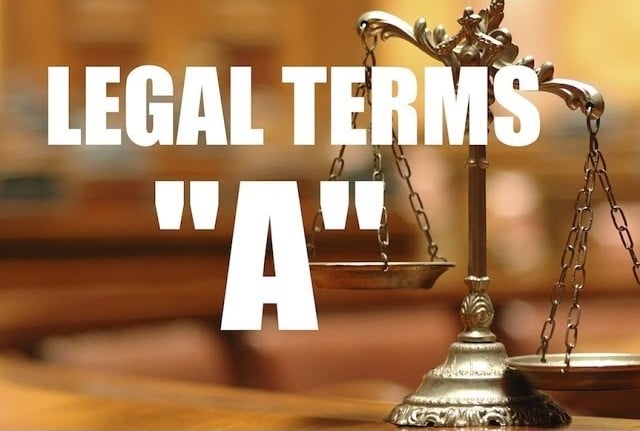Fundamental Legal Concepts and Principles
The legal landscape is populated with a complex array of terms and concepts that are crucial for understanding the workings of the justice system. Some of these concepts define the powers and limitations of courts and government agencies, while others relate to the rights and obligations of individuals within the legal framework. One such concept is mandamus, a court order compelling a public official or entity to perform a mandatory duty. In contrast, certiorari empowers a higher court to review a lower court’s decision. Navigating this intricate web of legal terminology is essential for anyone seeking to comprehend and engage with the legal system effectively. The presence of legal lacunae, or gaps in legislation, highlights the evolving nature of law and the challenges in addressing novel situations.
The exercise of discretion, an inherent aspect of judicial and administrative decision-making, allows for flexibility in applying the law to specific circumstances. However, this power must be wielded responsibly, as abuse of discretion can lead to unfair or arbitrary outcomes. Habeas corpus, a cornerstone of individual liberty, safeguards against unlawful detention by requiring authorities to justify a person’s imprisonment before a court. The burden of proof often rests on demonstrating a prima facie case, presenting evidence that, at first glance, appears sufficient to support a claim. Matters sub judice, currently under judicial consideration, are subject to restrictions on public discussion to ensure the integrity of the proceedings.
Acting ultra vires, exceeding one’s legal authority, can render actions invalid and subject to legal challenge. Similarly, actions taken in mala fide, or bad faith, can undermine the fairness and legitimacy of legal processes. The principle of res judicata prevents the relitigation of matters already decided by a court, promoting finality and efficiency in the judicial system. Distinguishing between the ratio decidendi, the legal reasoning behind a decision, and obiter dictum, incidental remarks by a judge, is crucial for understanding the precedential value of a court ruling.
Legal Aid, Advocacy, and Procedural Terms
Access to justice is a fundamental principle, and pro bono legal services, provided free of charge or at reduced fees, play a vital role in ensuring that individuals in need can access legal representation. Amicus curiae, or "friends of the court," contribute their expertise to assist courts in complex cases, offering valuable perspectives and information. A caveat serves as a warning or cautionary notice, alerting individuals to potential risks or legal implications. Contempt of court refers to actions that disrespect the court’s authority, while a default judgment is entered against a defendant who fails to respond to a lawsuit.
The concept of due process guarantees fair treatment and a fair trial, a cornerstone of a just legal system. Estoppel prevents individuals from contradicting their previous statements or actions, ensuring consistency and fairness in legal proceedings. Ex parte hearings, conducted without the presence of one party, are generally disfavored due to the potential for bias. In camera proceedings are conducted in private, often to protect sensitive information. Injunctions are court orders that compel or prohibit specific actions.
Appeals, Judicial Power, and Legal Standing
Interlocutory appeals allow for the review of legal issues before a final judgment, while judicial review empowers courts to assess the constitutionality of laws and government actions. Jurisdiction defines the authority of a court to hear a particular case. A litigant must demonstrate locus standi, or legal standing, to bring a lawsuit, ensuring that only those with a genuine interest in the outcome can participate in legal proceedings.
Mitigating circumstances can reduce the severity of a sentence, recognizing factors that lessen culpability. Nolle prosequi terminates a legal action, while per curiam decisions are issued by the court as a whole, rather than an individual judge. Peremptory challenges allow attorneys to dismiss potential jurors without specific cause, within certain limits. Plenary power denotes complete or absolute authority. Precedent refers to previous court decisions that guide future rulings, promoting consistency and predictability in legal outcomes.
Legal Representation, Principles, and Criminal Justice
Preliminary injunctions provide temporary relief before a trial, preserving the status quo. Individuals may choose to proceed pro se, representing themselves in court without an attorney. Res ipsa loquitur applies when negligence is apparent from the circumstances themselves. Perjury is the act of lying under oath, a serious offense that undermines the integrity of the legal system. Amicus briefs provide additional perspectives on a case, while cross-examination tests the credibility of witnesses. Circumstantial evidence indirectly suggests a fact, often used to build a case.
Alimony provides financial support to a spouse after divorce. Class actions allow a group with similar claims to sue collectively. Libel and slander are forms of defamation, written and spoken respectively. The burden of proof typically lies with the prosecution in criminal cases. Plea bargains involve negotiating a guilty plea to a lesser charge. Miranda rights protect the rights of arrested individuals. Parole allows for supervised release from prison before the end of a sentence. Misdemeanors are less serious crimes than felonies. Due process mandates fair treatment by the government in all legal matters. These concepts provide a foundation for understanding the intricate workings of the legal system.


